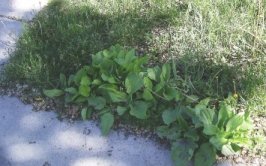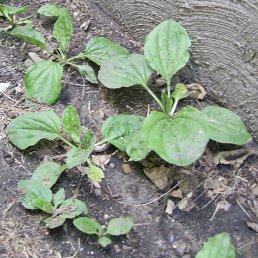Herbal Remedies

Herbal remedies are in the common plants and weeds growing all around us; they have been provided by God for the healing of our ailments and diseases - and I'll tell you about my earliest efforts to learn about them.
Many of the plants around us, underfoot on your property, or that you see beside the city sidewalk, are herbal remedies, part of God's pharmacy to provide healing solutions for even the poorest of the poor. The animals and birds know it is there, but in North America especially, over the last 200 to 300 years, we've become convinced that only doctors with training in medicines and medical procedures and surgeries know what is best for us. I'm sure they do know a lot of valuable information, but I'm still convinced that God knows far more than we do, and He is gracious enough to provide simple answers. If only we will be open-minded and willing to learn about those resources abundantly provided all around us.
Fortunately, there is also a fast growing segment of society looking for these natral alternative or herbal remedies.
There are many herbal remedies for the same health problem. This is because God knows that not all the plants will be in our vicinity; some thrive better in other climates. So don't try to track down every plant you hear about - just find the ones within your reach, the ones you have access to use.
I don't even pretend to know all about all these herbs, though my family and friends seem to think I know quite a bit more than they do. I just get excited whenever I discover a new herb and it's helpful traits and uses for our ailments. (This is one reason for this site; I need to sort out what exactly I know, and a place to share my NEW knowledge of specific herbs as I learn.
Reviewing My Learning Highlights
As I child I had a natural curiosity about plants that had flowers or were attractive, but I can't say I sought out many of them because of being sent to the garden to weed. My parents made sure I knew the difference between a vegetable and a weed so I wouldn't hack off the wrong plant in the garden. However, in those days, weeding wasn't much fun.
I do recall being sent out to the pasture to pick wild sorrel for the borscht my Gr'ma and also my mother made. Most Mennonite families have several borscht recipes, but my favourite was this one called Summa Borscht, which in those days we could only make when the "zurrump" (sorrel) was in season. If I was called to the door and handed a pail or enamel bowl and told to go pick sorrel I would happily dash off to hunt for those clumps of plants. Supper was going to be good today!
Sorrel leaves (sometimes called French Sorrel, I've learned) have a sour tang when chewed raw, but when they are cut up and tossed into a soup with a ham hock or smoked farmers sausage, and when the dill and potatoes have been added, with the buttermilk and sour cream poured in just before serving.... yum! That's a delicious and creamy soup, and I've always had an appetite for another bowl full or two after the first one.
In those days I had no idea that they could be eaten in a salad like spinach, and that these sour leaves were herbal remedies that would purify our blood, expel worms, or slow down profuse menstruation or a stomach hemorrhage. It expels gravel (kidney stones) and is good for jaundice, internal ulcers and skin diseases. I just knew that everybody liked summa borscht, that Gr'ma only served brown bread and butter with it, and that this treat didn't come until spring when the sorrel had sprung up in the pasture.
(As an adult I have for years now, harvested sorrel from our garden, washed it, and chopped it, and put it away in the freezer so I can make Summa Borscht any time I have a yen for it).
During my years in Ontario, I learned to spot and avoid ragweed because of my allergies. Now I've read that it has other names and valuable properties. Somehow I've not had a desire to try those out yet. But it was also there in Ontario, that I began to read up on alternative supplements, and that most of them come from herbs. So I began to pay attention to plants.
In 1983 I moved back home to my parents' place to care for them in their old age, and they were still avid gardeners, so I took a much bigger interest in what we had growing behind the house, and in bringing in more herbs into that rich, organic soil. Besides the aloe vera in our house, we had dill that grew wild all over the garden, self-seeded from the previous year turned out to have good value for easing bowel gas, besides going into mom's favourite dill pickle recipe. The summer savoury (Pappakrut) that also showed up in every nook and crannie of the garden became a favourite way to make meals tasty without using salt, which Mom was not to have. Now I learn that summer savoury is a specific remedy for wind colic, and when taken as a warm tea is great for suppressed menstruation and very useful for colds. (I haven't tried extracting the oil yet, but just a drop of that is suppose to relieve a toothache).

When Gr'ma moved into the nursing home at Rosthern I met other older ladies there, and one of them pointed out that there were excellent herbs growing beside most of the sidewalks in our small town. Huh!? Here I'd been walking on Plantain and trying to hack them out with a hoe? After I'd done some research I took a shopping bag out for a walk and gathered a whole sink full, just so I could dry some and freeze some. Now I'm glad whenever I spot another clump of plantain, because I can spread my harvest out. In fact, now I deliberately sow the plantain seeds in my flowerbeds.
That's another reason to grow them in the garden; you can see to it that your herbs are not sprayed with poison.
Same with my mint plants. Ever since I discovered what a delicious tea mint makes, I've taken to growing it in my flowerbeds and in the garden. I have guests ask for my mint tea, and it is so simple to make!
About two years later a neighbour was complaining about her comfrey taking over her flowerbed. I said, "Oh, I've read that's good for something." She replied that I should come dig up as much as I wanted. I went home, read up on comfrey and decided that definitely, yes, I wanted to take her up on the offer. I returned to her place with a spade and a bucket and brought home a large plant. At first it looked like it wasn't going to survive, but then it put down roots, and the following year it served me monstrous leaves that were at least 8 inches across and 18-20 inches long. They had a thick velvety pile on them. Dried and crumbled they make a wondrous tea for colds and problems with lungs or asthma, etc. Fresh they make great poultices to lay on fresh open wounds and help them to heal up in a hurry. Oh, such great herbal remedies!
(Incidentally, I dug up that plant and brought it with me when I moved to the city in 2007).
I hope I have whetted your interest to learn more about herbal remedies together with me. I plan to share all I can on each plant - a page for each, and once I'm caught up on my current knowledge (maybe before then), I've started a monthly ezine mailing to let you know when I come to a new discovery. Do sign up for the Aloe Vera Tips & Solutions (see subscribe form at top right column). Besides aloe vera articles, I share some simple ways to harvest and use herbs as herbal remedies.
When my younger sister Elsie moved to B.C. she left most of her library of books with me; it has some good herbal books. I can look up things, but of course research on the internet is a marvelous treasure trove too! There is really nothing to stop us from educating ourselves on this topic, and using herbal medicines from the plants God has scattered in our neighbourhood for our health and healing.
Why should we suffer just because we are ignorant of the answers? Let's research and find out what herbs to use and how to make herbal remedies! Let's start with just one or two, like plantain and calendula, and mint, okay? Then we'll gradually expand our knowledge of herbal remedies.
I've just discovered a delightful herbal book written and illustrated for children. You should go have a look at some of the pages too. Another site has a recipe using both calendula and plantain for a lip balm.
While I have my sister's Maria Treben's earlier book, "God's Pharmacy," referred to above, I have found online that she has a newer edition out now called, "Health from God's Garden" I was pleased to find more sites in which Maria Treben shares her knowledge of many herbs and herbal remedies.
1. enter your friend(s) email(s)
2. If they buy, they get 25% off their first purchase
3. And you get $40 put into your account!
Refer-a-Friend Form is HERE!
